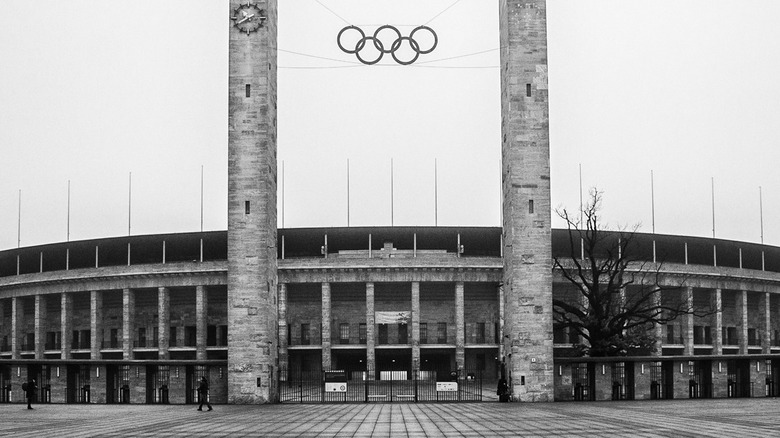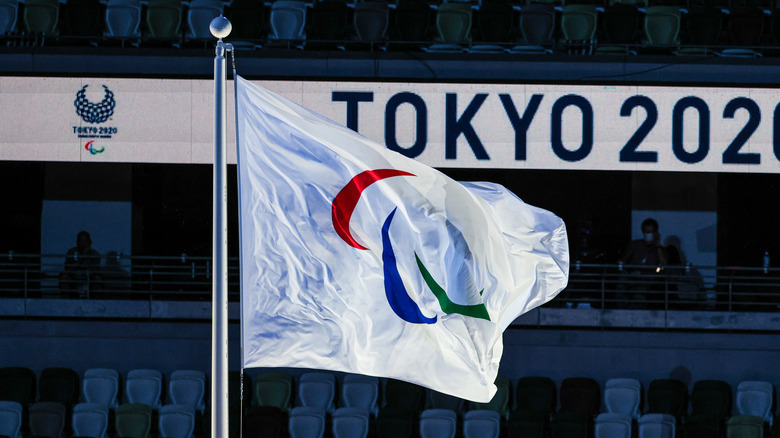A Brief History Of The Olympic Games That Never Happened
Since their inception in 1896 (via History), the International Summer Olympics have served as both a ritual of cooperation and a proxy stage for conflicts of culture and commerce (via The Guardian). Territorial disputes, economic spats, and the fiery rhetoric of the political sphere are left outside the arena, and leaders instead adapt the language of a lofty Olympic speech. Every four years, 200-plus nations (via World Atlas) expend tremendous resources to converge for this display of sportsmanship, prowess, and performative unity. However, the world has seen dark days in the near-century-and-a-half since the initial Olympic Games commenced in Athens, and a few of our more egregious historical moments have been so dire the Olympic Commission has scrapped its plans for the quadrennial games.
The Summer Olympics have been canceled or delayed four times, and the Winter Olympics twice, according to Mental Floss. The first three times the games were nixed (1919, 1940, and 1944 — via History), our major world powers were preoccupied by their varying degrees of entanglement in modern history's most horrific wars (World War I and World War II). For the fourth (2020), nearly every nation was ravaged by a pandemic that by the end of the Olympic year had left nearly 2 million dead (via International Olympic Committee, Our World in Data, January 1, 2021 statistics). As the world powers once again prepare for the Olympics, it's worth recollection that while this exact scenario may not have happened before, 2020 wasn't the first time we'd decided it might not be a great time to "do sports."
1916 Summer Olympics in Berlin
When war broke out on July 28, 1914, most believed the conflict would be short-lived (via History). Instead, Europe's fragile peace was quickly shattered, and the major world powers would spend the next four years embroiled in a "Great War" that would carve out the sphere of global politics for the next century of modern history. It did not, however, interrupt the plans of the International Olympic Committee organizers in Berlin, Germany.
The Games of the VI Olympiad (or 1916 Olympics) were scheduled to take place in Berlin, and preparations initially continued despite the outbreak of World War I (via Olympics Wiki). The war, however, did not deescalate as hoped, and nations soon pushed to move the games to a country not entangled in the throes of global conflict. Germany (which was not a neutral country), resisted this urging, refusing to surrender its status as host nation lest they be humiliated (via The East Sussex WW1 Project). This obviously posed logistical problems. As hostilities on both the Western and Eastern fronts intensified, it became clear the war would not resolve itself in time for the Olympics in Berlin. The Olympic Games were canceled.
The Deutsches Stadion built for the 1916 Games stood empty and was never used for its intended purpose. The 1920 Olympics took place in Antwerp, Belgium, despite the specter of ongoing war, but Germany was not again allowed to participate until 1925 (via The East Sussex WW1 Project).
1940 Olympics in Tokyo and Helsinki
After the 1936 Olympics took place in Nazi Germany, The Washington Post wrote, "Hate and fear are known to be blowing hard on the Olympic flame in Berlin ... Will there be any essence of fair play and sportsmanship left to illuminate the 12th Olympics in Tokyo?"
There was not. On the eve of the 1940 12th Olympics, "sportsmanship" was still not in the air — only more hostilities, and the outbreak of a second world war. Although Japan had been enthusiastic to host the games in Tokyo as a show of goodwill, some Allied nations expressed mixed opinions about Japan's loyalties as a host nation (via The Washington Post) and threats of a boycott soon broke out. Amidst a whirlwind of pressures on several fronts, including a wartime steel shortage, Japan pulled out, and the International Olympic Committee decided to move the games to Helsinki, Finland. However, when Hitler's troops marched on Poland and World War II officially erupted in 1939 (via History), the games were canceled altogether as would-be athletes were drafted to war.
1944 Summer Olympics in London
The 1944 London Olympic Games were also canceled due to World War II. The war had stretched on, now in its fifth year, and although international "sportsmanship" could hardly be in a more adverse state, the International Olympic Committee did not forget the games entirely. According to Europeana, the committee held events to commemorate the 50th anniversary of its founding even if the official festivities could not realistically take place.
Despite the grim international mood, others found ways to celebrate, even from within German POW camps. The "1944 Woldenberg Olympics," Europeana and Pollonia Pressbox note, were an unofficial Olympic celebration held by the Polish prisoners in captivity at Woldenberg (Dobiegniew) Oflag II-C, a German POW camp. After eventually winning consent from their German captors to hold the games, several hundred prisoners are believed to have participated in the "Olympics," competing in games like basketball, volleyball, and chess (via Mental Floss).
2020 Summer Olympics in Tokyo
After documented cases of SARS-COVID-19 began to multiply in March 2020, the International Olympic Committee (IOC) decided the 2020 Olympic Games, initially scheduled to begin that July in Tokyo, could not take place without risking even greater global outbreaks of the virus (via IOC). Japanese Prime Minister Shinzo Abe and representatives of the IOC announced the games' postponement on March 24, 2020 (via NBC Universal), with Japan promising to host the games once it was safe to do so. The games instead took place in July 2021.
According to The New York Times, the IOC bowed to pressure from Olympic athletes and global health experts to postpone the games for safety reasons. Large social gatherings, such as millions of tourists gathered in a stadium to watch a sporting event, are known to cause mass outbreaks of the virus (via World Health Organization), meaning the Olympics could only take place in at atmosphere of tremendous risk to athletes and attendees. Additionally, travel (such as that required for an international competition) and bodily fluids (such as the sweat produced by physical activities like sports) pose serious risks (via Centers for Disease Control and Prevention). All of these factors combined to make an event like the Olympics a guaranteed health hazard, no one but the coronavirus would win.
The Olympic flame, scheduled to be carried across the stage, arrived in Tokyo on March 20, NBC Universal reported. Instead, the flame, like the rest of the pandemic world, sat dormant for a year.




